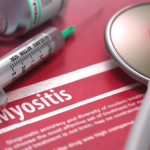myositis-specific autoantibodies,” says Dr. Aggarwal. Even at the Pittsburgh Myositis Center, which has an extremely comprehensive myositis lab, he notes that patients only have a positive myositis-specific autoantibody in about 60–70% of cases. He notes, “I think [that] in the future we will be able to discover these autoantibodies and, hopefully, come up to 90% or more.”
Research into myositis is challenging, partly because the group of conditions is both rare and heterogeneous in its manifestations. Autoantibodies may open up new research avenues as clinicians can bring more uniformity to myositis research. “We still enroll patients with clinical symptoms of polymyositis and dermatomyositis or juvenile myositis or cancer-associated myositis,” notes Dr. Aggarwal. “However, now we are able to do post hoc analyses in clinical studies to see which of the autoantibody subset groups show better outcomes or other unique features.”
For example, in a recent clinical trial, 200 myositis patients with refractory DM, PM and juvenile DM were treated with rituximab.17 A post hoc analysis allowed researchers to see that patients with antisynthetase syndrome showed the best improvement of all the antibody groups. “Within this heterogeneous group we are able to have some uniformity using autoantibodies,” Dr. Aggarwal explains.
Dr. Aggarwal provides another example from disease-subset-specific treatment in patients positive for the anti-HMGCR antibody.18 “These patients in a limited data set have been shown to respond very well to IVIG even as a monotherapy.”
When to Get Help
Many general rheumatologists can successfully care for these IIM patients, but Dr. Aggarwal recommends referral in certain situations. If clinicians are struggling with diagnosis or with treatment-resistant disease, expert help may be needed. Dr. Aggarwal adds, “When the patient has severe disease to begin with, for example a patient with severe interstitial lung disease with myositis, I recommend clinicians refer to a more experienced myositis center.”
Ruth Jessen Hickman, MD, is a graduate of the Indiana University School of Medicine. She is a freelance medical and science writer living in Bloomington, Ind.
References
- Allenbach Y, Benveniste O. Diagnostic utility of autoantibodies in inflammatory muscle diseases. J Neuromuscul Dis. 2015;2(1):13–25.
- Ghirardello A, Bassi N, Palma L, et al. Autoantibodies in polymyositis and dermatomyositis. Curr Rheumatol Rep. 2013 Jun;15(6):335.
- Gunawardena H. The clinical features of myositis-associated autoantibodies: A review. Clin Rev Allergy Immunol. 2017 Feb;52(1):45–57.
- Basharat P. Idiopathic inflammatory myopathies: Association with overlap myositis and syndromes: Classification, clinical characteristics, and associated autoantibodies. EMJ Rheumatol. 2016;3(1):128–135.
- Mandel DE, Malemud CJ, Askari AD. Idiopathic inflammatory myopathies: A review of the classification and impact of pathogenesis. Int J Mol Sci. 2017 May 18;18(5): pii: E1084. doi:10.3390/ijms18051084.
- Lundberg IE. Myositis in 2016: New tools for diagnosis and therapy. Nat Rev Rheumatol. 2017 Jan 25;13(2):74–76. doi:10.1038/nrrheum.2017.1.
- Koenig M, Fritzler MJ, Targoff IN, et al. Heterogeneity of autoantibodies in 100 patients with autoimmune myositis: Insights into clinical features and outcomes. Arthritis Res Ther. 2007;9(4):R78.
- Haq SA, Tournadre A. Idiopathic inflammatory myopathies: From immunopathogenesis to new therapeutic targets. Int J Rheum Dis. 2015 Nov;18(8):818–825. doi:10.1111/1756-185X.12736.
- Sato S, Kuwana M, Fujita T, Suzuki Y. Anti-CADM-140/MDA5 autoantibody titer correlates with disease activity and predicts disease outcome in patients with dermatomyositis and rapidly progressive interstitial lung disease. Mod Rheumatol. 2013 May;23(3):496–502.
- Fujimoto M, Hamaguchi Y, Kaji K, et al. Myositis-specific anti-155/140 autoantibodies target transcription intermediary factor 1 family proteins. Arthritis Rheum. 2012 Feb;64(2):513–522.
- Mammen AL, Casciola-Rosen L, Christopher-Stine L, et al. Myositis-specific autoantibodies are specific for myositis compared to genetic muscle disease. Neurol Neuroimmunol Neuro Inflamma. 2015 Nov 19;2(6):e172.
- Ichimura Y, Matsushita T, Hamaguchi Y, et al. Anti-NXP2 autoantibodies in adult patients with idiopathic inflammatory myopathies: possible association with malignancy. Ann Rheum Dis. 2012 May;71(5):710–713.
- Albrecht I, Wick C, Hallgren Å, et al. Development of autoantibodies against muscle-specific FHL1 in severe inflammatory myopathies. J Clin Invest. 2015 Dec;125(12):4612–4624.
- Selva-O’Callaghan A, Trallero-Araguás E, Martınez MA, et al. Inflammatory myopathy: Diagnosis and clinical course, specific clinical scenarios and new complementary tools. Expert Rev Clin Immunol. 2015 Jun;11(6):737–747.
- Tjärnlund A, Bottai M, Rider LG, et al. Progress report on development of classification criteria for adult and juvenile idiopathic inflammatory myopathies (abstract 753). Paper presented at 2012 ACR/ARHP Annual Meeting; 2012 Nov 9–14; Washington, D.C.
- O’Connor A, Mulhall J, Harney SMJ, et al. Investigating idiopathic inflammatory myopathy; initial cross specialty experience with use of the extended myositis antibody panel. Clin Pract. 2017 May 4;7(2):922.
- Aggarwal R, Bandos A, Reed AM, et al. Predictors of clinical improvement in rituximab-treated refractory adult and juvenile dermatomyositis and adult polymyositis. Arthritis Rheumatol. 2014 Mar;66(3):740–749.
- Mammen AL, Tiniakou E. Intravenous immune globulin for statin-triggered autoimmune myopathy. N Engl J Med. 2015 Oct 22;373(17):1680–1682.


